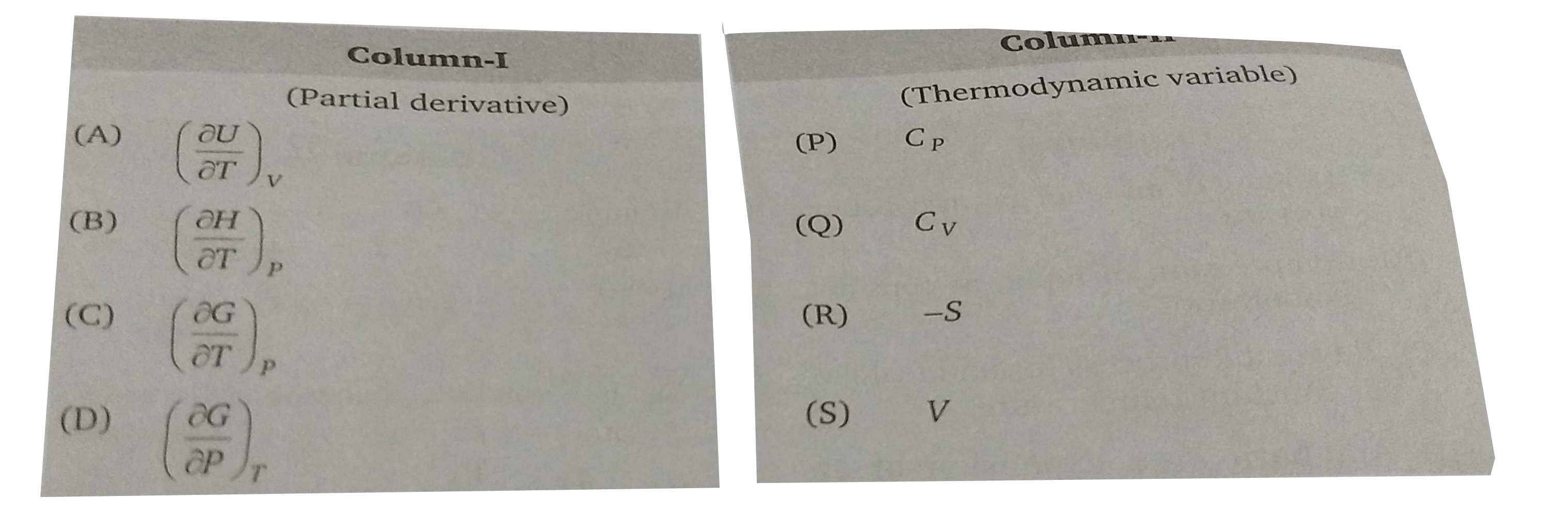19 gm of ice is converted into water at and 1 atm. The entropies of and are 38.2 and respectively. The enthalpy change for this conversion is : Solution in Punjabi
None of these
The correct Answer is:A
At equilibrium
Topper's Solved these Questions
- THERMODYNAMICSBOOK - NARENDRA AWASTHICHAPTER - THERMODYNAMICSEXERCISE - Level 3 - One Or More Answers Are Correct
1 Videos
- THERMODYNAMICSBOOK - NARENDRA AWASTHICHAPTER - THERMODYNAMICSEXERCISE - Level 3 - Match The Column
2 Videos
- THERMODYNAMICSBOOK - NARENDRA AWASTHICHAPTER - THERMODYNAMICSEXERCISE - Level 2 (Q.1 To Q.30)
1 Videos
- STOICHIOMETRYBOOK - NARENDRA AWASTHICHAPTER - STOICHIOMETRYEXERCISE - Level 3 - Subjective Problems
20 Videos
Similar Questions
Assume ideal gas behaviour for all the gases considered and neglect vibrational degrees of freedom. Separate equimolar sample. Separate equimolar samples of Ne, O2 , CO2 and SO2 were subjected to a two process as mentioned. Initially all are at same state of temperature and pressue.
Step I → All undergo reversible adiabatic expansion to attain same final volume, which is double the original volume thereby causing the decreases in their temperature.
Step → After step I all are given appropriate amount of heat isochorically to restore the original temperature.
Mark the correct option(s) :
View SolutionMatch the following columns

View SolutionWrite structure of 2,2-dimethylheptane.
View SolutionWhat volume of a liquid (in L) will contain 10 mole ? If molar mass of liquid is 280 and its density is 1.4 g/mL.
View SolutionOne mole of ice is converted into water at 273K . The entropies of H_2O(s) and H_2O(l) are 38.20 and 60.01Jmol^(-1)K^(-1) respectively. The enthalpy change for the conversion is:
View SolutionWhich of the followingk is true for the process H_(2) O (s) = H_(2) O (l) at 0^(@)C and 1 atm?
View SolutionFor the transformation, H_(2)O(l,1 atm) "to H_(2)O (g,1atm), DeltaH_(vap)=40.668kJmol^(-) The change in entropy (JK^(-)mol^(-)) is:
View SolutionCalculate the change in enthalpy for the following process at 1 atm
H2O(1,50∘C)→H2O(g,150∘C) given that ΔHv at 100∘C is 40.7kJmol−1
Cp(H2O,l)=75.0Jmol−1K−1
Cp(H2O,g)=33.3Jmol−1K−1
View Solution19 gm of ice is converted into water at 0∘C and 1 atm. The entropies of H2O(s) and H2O(l) are 38.2 and 60J/mol K respectively. The enthalpy change for this conversion is :
View SolutionOne mole of ice is converted into water at 273 K. The entropies of H_(2)O(s) and H_(2)O(l) are 38.20 and 60.01 J mol^(-1)K^(-1) respectively. Calculate the enthalpy change for this conversion a ?
View SolutionEnthalpy change for the process,
H2O(ice)⇔H2O(water)
is 6.01 kJ mol−1. The entropy change of 1 mole of ice at its melting point will be
View SolutionFor the melting of ice at 25∘C:
H2O(s)→H2O(l)
The enthalpy of fusion is 6.97kJmol−1 and entropy of fusion is 25.4Jmol−1K−1.Calculate the free energy change and predict whether melting of ice is spontaneous or not at this temperature.
View SolutionOne mole of ice is coverted into water at 273 K. The entropies of H2O(s)andH2O(l) are 38.20 and 60.01Jmol−1K−1 respectively.
The enthaply change for the conversion is
View Solution18g of ice is converted into water at 0∘C and 1 atm. The entropies of H2O (s) and H2O (l) are 38.2 and 60J/mol K respectively. The enthalpy cange for this conversion is:
View SolutionOne mole of ice is converted into water at 273 K. The entropies of H_2O_((s)) and H_2O_((l)) are 38.20 and 60.01 J mol^(-1)K^(-1) respectively. The enthalpy change for the conversion is
View Solution19 gm of ice is converted into water at 0^(@)C and 1 atm. The entropies of H_(2)O(s) and H_(2)O(l) are 38.2 and 60 J//"mol " K respectively. The enthalpy change for this conversion is :
View Solution
